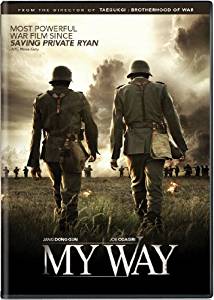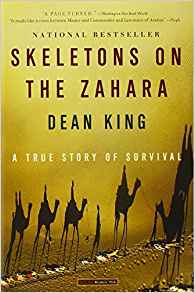|
In a recent conversation with friends about books and movies I shared that I watched a movie my dad had recommended called Hacksaw Ridge -- the story of Desmond Doss who served in WWII as an American Army Medic and saved dozens of lives all the while refusing to pick up a gun. His bravery and service earned him the Medal of Honor, the first ever awarded to a soldier who never fired a shot. I described the movie as a beautiful depiction of faith and sacrifice.
My Korean-American friend sitting across from me nodded gravely, willing himself to remember the title and give the film a try. Then he offered his own recommendations, including the recent Korean film called My Way which depicts the rivalry of two marathon runners, one Korean and one Japanese, and how their relationship is transformed through their service in WWII, first in the Japanese Imperial Army and then as conscripted soldiers serving in the Red Army and later in the Wehrmacht. My friend asked me what I knew about Korean-Japanese rivalry, and he seemed impressed that as young and American (naive) as I am, I had some understanding from reading Pachinko by Min Jin Lee (which we discussed in book club) and Beyond Colorblind by Sarah Shin. He told me to give the film a try and let him know what I thought. My friend also had a book recommendation for me -- Skeletons on the Zahara by Dean King. He said it was one of the most powerful books he had ever read. Well, a comment like that makes me take notice, and the brief description he provided -- of shipwrecked American sailors being enslaved in the Sahara and how it influenced Americans’ view of slavery -- seemed like a unique point of view to add to my ongoing study of race and culture. As a testament to the unusual rhythms of my life, I first found time to read the book and was hooked even by the introduction. The text itself I found tedious as Dean King interweaves the first accounts of Captain James Riley and sailor Archibald Robbins who were two of the crew to become captured and enslaved by the Sahwari tribes when their ship the Commerce ran aground off the coast of Morocco in 1815. King details their plight to wander the desert for many months at the whim of their new masters, clad in little clothing, fed with meager provisions and suffering from extreme dehydration and other ailments. Paramount was their lack of control over their fate until some of the sailors, led by Riley, happened to meet an Arab who was sympathetic to their situation -- enough to bring them to the city of Swearah (modern day Essaouira) where he could sell the sailors for ransom to an official at an English consulate there. When Riley finally returned to America he recorded his story and publicized it widely. He originally titled his work Authentic Narrative of the Loss of the American Brig 'Commerce' by the "Late Master and Supercargo" James Riley. It was later retitled Sufferings in Africa. Among his readers was a young Abraham Lincoln, who later listed Riley’s book among the most influential books that shaped his political ideology and views on slavery. Riley himself participated in other abolitionist work before returning to the sea near the end of his life. At some point during my reading, my daughter spied the book and asked me about it. I relayed to her what I was learning -- about white slavery in Africa, about its influence on Abraham Lincoln, and about how long it took our country to begin to change -- first through the Civil War, and then through the Civil Rights Movement one hundred years after that, and through to today when racial discrimination still exists despite all of the laws to suggest otherwise. My daughter sat next to me shocked to disbelief that people could take so long to change -- and that they could have such flawed views of humanity to begin with. Sometime after speaking to her I also read Reconstruction: A Concise History by Allen C. Guelzo and found myself sharing her frustration over the quagmire of opinions and policies that competed to advance the rights of American citizens and fell short of satisfying generations of people. Today, if you do a Wikipedia search for Captain James Riley, he appears, but there are many other James Riley’s, and his story perhaps sinks into oblivion. The one copy of his original work within the extensive Minuteman Library Network is missing. But the influence of his writing helped shape the ideologies and passions of this country that cries out for freedom, and regardless of falling nameless, his story lives on in our lives. Having delved into so much heavy history, I was ready for a change of pace and finally carved out two evenings to screen My Way, roping my husband into watching it with me. I was expecting a Korean version of Unbroken by Laura Hillenbrand (which I read a few years ago with the library book club, although I haven’t seen the film). Certainly some themes were similar -- running...Olympic dreams...service in the Pacific during WWII… But by the end, I knew this story would stay with me in a different way from that of Louis Zamperini suffering in the Pacific -- or even that of Desmond Doss saving souls on Hacksaw Ridge. Purporting to be based on a true events, the story created by director Kang Je-gyu is that of good heartfelt tragedy. A three tissue movie, my mom would say. After competing on unfair grounds his entire life, a Korean marathon runner ultimately surrenders his very identity to save his lifelong enemy, a Japanese marathon runner, who, over the course of their captivity in WWII, becomes his brother in fate. However, it turns out that My Way was written on extreme conjecture of the life of a supposed-Korean man with Japanese features named Yang Kyoungjong who was captured by Americans at Normandy after having been conscripted by the Japanese Imperial Army, the Red Army and the Wehrmacht. Even more perplexing, there is no official record of Yang Kyoungjong existing before his capture. There is nothing in that history about marathon running. Nothing even about a rivalry let alone a friendship. So moved by the film, I was angry at first that it wasn’t based more in fact. Still, I made myself get over that in order to understand its deeper message as it begged me to consider: How can a Korean man forgive the Japanese who dictated his life and the lives of his people? The story wasn’t meant to glorify a particular man’s name. There were no medals awarded for the beautiful sacrifices shown by the Korean soldier. After finding themselves repeatedly on the losing side of the war, the soldiers slip into legend and become a vehicle for ethnic healing after generations of oppression. Consider viewing My Way or even taking on Skeletons on the Zahara and challenge yourself to new perspectives and the way our humble sacrifices live on, even without the medals.
0 Comments
Leave a Reply. |
Author's Log
Here you will find a catalog of my writing and reflections. Archives
December 2022
|

